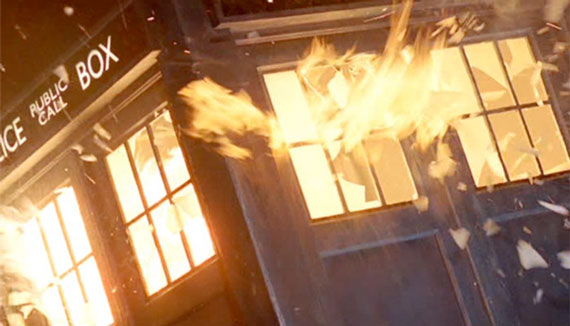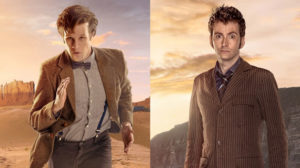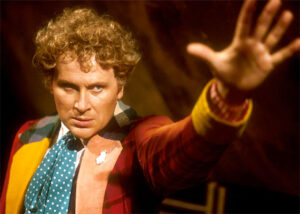Reigniting A Lost Fandom

Feature by Robert Johnston.
The end of Series 12 of Doctor Who’s revived series created a bigger divide in the fandom than ever before. The idea of ‘canon’, the established mythology of the show, has been changed forever. The show is no stranger to changing what was previously accepted as ‘canon’, throughout the classic series there were many different ideas on who the Doctor was, what he meant to the Time Lords and the rest of the universe. More recently, the previous ‘Moffat’ era was well known for shifting canon around and adding in new information in the gaps. What the difference is between these instances and Series 12 (the episode ‘The Timeless Children’ in particular) is that the previous example doesn’t fundamentally change who the Doctor is. He is just another Time Lord who wants to see the universe and eventually helps those in need, becoming the hero he is now seen as.
 Moffat introduced two big changes to what was previously established as canon: the inclusion of the War Doctor in ‘The Day of the Doctor’ and the regeneration limit in ‘The Time of the Doctor’. These fit in as they are introduced with as much care as they possibly could be. The previously unseen ‘War Doctor’ fits into a time the show has seldom explored before – The Time War. It also helps the next inclusion into canon, as this new incarnation is used as evidence as to why the Doctor, on his ‘eleventh’ incarnation is facing the end of his life. This leads the Time Lords to give the Doctor a new regeneration cycle, a concept previously mentioned in 1983’s ‘The Five Doctors’. Both of these changes fit into the mythology of the show with little disruption to established canon.
Moffat introduced two big changes to what was previously established as canon: the inclusion of the War Doctor in ‘The Day of the Doctor’ and the regeneration limit in ‘The Time of the Doctor’. These fit in as they are introduced with as much care as they possibly could be. The previously unseen ‘War Doctor’ fits into a time the show has seldom explored before – The Time War. It also helps the next inclusion into canon, as this new incarnation is used as evidence as to why the Doctor, on his ‘eleventh’ incarnation is facing the end of his life. This leads the Time Lords to give the Doctor a new regeneration cycle, a concept previously mentioned in 1983’s ‘The Five Doctors’. Both of these changes fit into the mythology of the show with little disruption to established canon.
The difference in these two episodes also lies within how these instances are treated within the episodes. Information from the changes in previous eras felt like they fit in with what had come before and weren’t waving away massive chunks of mythology and canon from the series. Moffat wasn’t perfect, the arc of ‘The Hybrid’ and the episode ‘Hell Bent’ mess with some canon and the depiction of the First Doctor in ‘Twice Upon a Time’ polarised fans.
 ‘The Timeless Children’ needlessly establishes a whole new backstory on who the Doctor is, making them the science project that creates the Time Lord race and making what was established for 50+ years just a lie to cover up the truth. Instead of Rassilon (an established character seen in both classic and new series episodes) being the creator and founder of current Time Lord society, it is now a totally different person whose existence is the subject of a cover up. It’s a round piece trying to fit in a square hole, all of this ‘new history’ just doesn’t fit with what has happened before.
‘The Timeless Children’ needlessly establishes a whole new backstory on who the Doctor is, making them the science project that creates the Time Lord race and making what was established for 50+ years just a lie to cover up the truth. Instead of Rassilon (an established character seen in both classic and new series episodes) being the creator and founder of current Time Lord society, it is now a totally different person whose existence is the subject of a cover up. It’s a round piece trying to fit in a square hole, all of this ‘new history’ just doesn’t fit with what has happened before.
The biggest problem with the new history is that it really doesn’t challenge the character of the Doctor who is told that these ground breaking revelations don’t matter. Not only do we find out that Time Lord society was built on a lie, Chibnall then proceeds to wipe out that last seven years of Moffat’s work in restoring Gallifrey by having the Master destroy the planet yet again!
In the day after this episode aired, I spent some time wondering why the showrunners would vandalise the established mythology of a long-running show. Then, after a long discussion about the current state of sci-fi with a friend, I remembered what made me fall in love with the show.
 Doctor Who was a show that offered thrilling spectacle, monsters, excitement, likeable leads and stories that could be enjoyed by everyone. Ten years ago, when my first Doctor regenerated, I didn’t immediately warm to his successor, but I still returned to the show. The Doctor was a character I aspired to – he used his words and his wit to solve problems, rather than his fists.
Doctor Who was a show that offered thrilling spectacle, monsters, excitement, likeable leads and stories that could be enjoyed by everyone. Ten years ago, when my first Doctor regenerated, I didn’t immediately warm to his successor, but I still returned to the show. The Doctor was a character I aspired to – he used his words and his wit to solve problems, rather than his fists.
I was a kid with no friends and endlessly bullied for a very long time and he was something I could always rely on. A character who protected the innocent and cared for everyone he met. He was my hero. Whether featured within slow burning classic shows – sometimes in black and white – the Doctor remained the same. As a viewer, I was able to look past his crotchety moods, silly coats and poorly written stories because all of the Doctors from Hartnell to Capaldi felt like they were my friend.
Now that simple feeling is gone, and the events of ‘The Timeless Children’ excludes me by erasing the show’s history. In doing this, it sends me the message that my love for previous iterations of the show is irrelevant. It doesn’t matter. My friend is gone, and I want them back.
 Series 11 and the start of Series 12 left me feeling cold and uninterested, so I had started collecting the new Classic Series Collection Blu-Ray sets. Two of them were now sitting on my shelf, waiting for me to watch. But I was hesitant, I would look at them and find something, anything else to watch. I began to worry. Had the most recent seasons of the show poured cold water on my fandom? I was afraid I’d never like any part of the show again. One night, however, I plucked up the courage, grabbed my classic Season 10 and began ‘The Three Doctors’.
Series 11 and the start of Series 12 left me feeling cold and uninterested, so I had started collecting the new Classic Series Collection Blu-Ray sets. Two of them were now sitting on my shelf, waiting for me to watch. But I was hesitant, I would look at them and find something, anything else to watch. I began to worry. Had the most recent seasons of the show poured cold water on my fandom? I was afraid I’d never like any part of the show again. One night, however, I plucked up the courage, grabbed my classic Season 10 and began ‘The Three Doctors’.
Everything came flooding back straight away, my love for the show was back. I enjoyed every single minute of every story, every monster, the connection between Jon Pertwee and Katy Manning. I felt every emotion, from exhilaration when all three Doctors appeared together, to fear as the deadly Drashigs broke out of the Miniscope. From wonder as the Master and the Doctor use their wits to out maneuver each another, to excitement when the Daleks appeared in force on Spiridon. I felt the Doctor’s sadness when Jo Grant left him for the last time, the intense emotion etched onto John Pertwee’s face as he drove off.
The season was over and my love for the show returned, seemingly uncovered. I was ready to keep going with classic Season 23 when a single episode from the currently airing Series 12 caused me to lose all motivation to watch any Doctor Who at all.
 Determined to rekindle my fandom, I bravely pressed play on the Blu-Ray player and those feelings came back faster than before! The Sixth Doctor immediately bounced off the screen and was a joy to watch! The Valeyard was a vicious, scenery chewing villain for 14 episodes. The adventures on Ravalox, Thoros-Beta, the ship Hyperion 3 and even inside the Matrix on Gallifrey were all fun and great to see once again. Both companions – Peri and Mel – felt properly integrated into the stories being told. Doctor Who was fun again – it felt like the magical show I’d fallen in love with all those years ago.
Determined to rekindle my fandom, I bravely pressed play on the Blu-Ray player and those feelings came back faster than before! The Sixth Doctor immediately bounced off the screen and was a joy to watch! The Valeyard was a vicious, scenery chewing villain for 14 episodes. The adventures on Ravalox, Thoros-Beta, the ship Hyperion 3 and even inside the Matrix on Gallifrey were all fun and great to see once again. Both companions – Peri and Mel – felt properly integrated into the stories being told. Doctor Who was fun again – it felt like the magical show I’d fallen in love with all those years ago.
In the end, the current iteration of the show is just not for me, from the writing to the acting to even the production values. I don’t blame the writers or the actors or anyone who works on the show personally, they’re all making a show that means something to them, that gives them the same feelings that I used to have for the eras I have the most nostalgia for. It’s just a personal shame for me that this is the first era of the show that I struggle to connect with, because I still love Doctor Who and I want it to keep being loved by everyone. I can see all the fans who still love the show and praise it every week and I want to be a part of that side of the fandom again, rather than not liking something that I loved for so long.
But for now, I’ll have to wait and see what happens. Time will tell – it always does.








